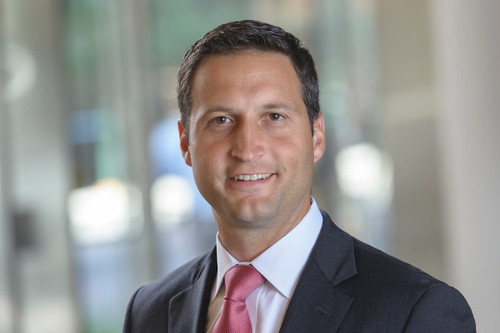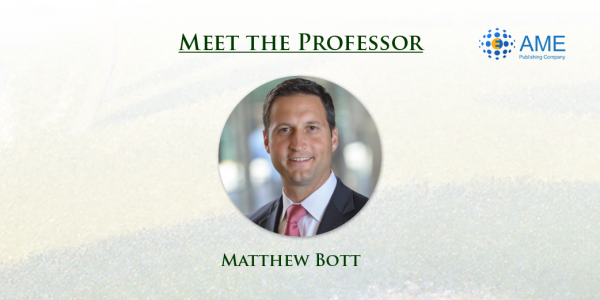Editor’s note
The 27th Annual Meeting of the European Society of Thoracic Surgeons (ESTS) was held on June 9–12, 2019 at the Convention Centre Dublin, in Dublin, Ireland. As the world’s top event in the field of general thoracic surgery, the ESTS annual meeting brings together thousands of experts and scholars from around the world to discuss the hotspots of thoracic surgery, update research progress, and share their experiences. The AME editorial team was with great honor to meet Dr. Matthew Bott during the meeting and has finished a brief interview via email after the meeting.
Expert introduction
Dr. Matthew Bott (Figures 1,2) is a surgeon at the Department of Surgery, Memorial Sloan Kettering Cancer Center, New York, USA. He specializes in treating cancers of the chest. These types of cancers include lung cancer, esophageal cancer, thymic tumors, neuroendocrine tumors, and mesothelioma. He has experience in using the latest technology to diagnose and treat a wide variety of diseases of the lung, esophagus, and chest wall. He performs these operations through small incisions with the goal of minimizing discomfort and accelerating recovery. He also focuses on techniques and procedures to improve symptoms and quality of life in people with advanced cancer. Working with his colleagues in medical and radiation oncology, they emphasize treatment plans that are unique and are tailored to each patient’s needs.

Figure 1 Dr. Matthew Bott.
Interview
CCTS: You have a lecture about key papers of “Basic Science” through the year on the section of on Sunday, 09 June 2019. Would you please briefly introduce some of the major results of the key papers and what would be the research focus or trend of basic science in the future?
Dr. Bott: There were a number of exciting scientific papers published in 2018. Perhaps at the top of the list was a study describing a covalent inhibitor of mutant KRAS (G12C). While several other driver gene mutations (EGFR, BRAF, etc.) have clinically available inhibitors, KRAS, the most commonly mutated oncogene in lung adenocarcinoma, has been resistant to targeted therapy. Therefore, these inhibitors hold substantial promise in the clinic. In addition to this, the identification of novel therapeutic targets such as SHP2/PTPN11 is particularly exciting as well. Related to targeted therapy, mechanisms of resistance to the third generation EGFR TKI osimertinib was an active area of research as well.
There were also a number of papers related to immunotherapy which were prominent this year. For instance, the discovery that STK11/LKB1 mutation predicts resistance to anti-PD-1 therapy and papers describing a link between the gut microbiome and response to checkpoint inhibition hold clinical relevance as well. Finally, the interaction between targeted therapy and immune surveillance remains an active area of interest as well.
Technology papers were another hot topic. For instance, papers describing the application of deep learning visual recognition algorithms to lung cancer histology or the utility of circulating tumor DNA (ctDNA) for a myriad clinical applications both received considerable attention.
Figure 2 Dr. Matthew Bott and the editors at the booth of AME Publishing Company in the venue.
CCTS: Mr. Bill Gates predicted that cancers could be cured when he talked about possible breakthroughs in science and technologies in 10 years during his visit to China in November 2018. Would you agree? If yes, what cancer types among thoracic tumors do you think are more likely to be cured?
Dr. Bott: I’m not sure that universal cure within 10 years is necessarily likely but we will almost certainly continue to make progress toward better treatments and improved survival. The advent of immunotherapy has produced durable responses in patients with metastatic lung cancer and I expect that the population that benefits from these treatments will expand over time as our knowledge grows.
CCTS: Your team have emphasized on treatment plans that are unique and are tailored to each patient’s needs. Based on your research experience, how would you comment on the current progress of “personalized medicine” and where do you see it is leading in the future?
Dr. Bott: The traditional concept of precision medicine as a tailored drug for every patient is certainly alive and well. However, I think in the current era we are in some ways moving beyond this paradigm as a substantial portion of patients do not have an identifiable drug target. Therefore treatments like immunotherapy which are applicable to subsets of patients but are ultimately agnostic to a specific driver gene may play an increasing role.
CCTS: What sparked your interest to be a thoracic surgeon?
Dr. Bott: During my surgical training I had access to outstanding mentors who sparked my interest in the field. I was immediately intrigued by thoracic anatomy and became uniquely interested in the clinical treatment of lung cancer. Similarly, I performed a research fellowship during my general surgery residency which instilled a deep appreciation for thoracic oncology and the scientific pursuit of better treatments. This happened to coincide with the clinical implementation of tumor sequencing and targeted therapy so it was a very exciting time in the field.
CCTS: What is the greatest gratification as a thoracic surgeon?
Dr. Bott: Improving the lives of patients while making meaningful contributions to our understanding of the disease processes we treat.
CCTS: What is the best way for people to learn and advance in a modern surgical career with booming knowledge and rapidly changing technologies? Should they highly focus on and specialize in an area or try to dabble in as extensive areas as they can?
Dr. Bott: I would suggest a combination of both. I think in research today, one must be at least casually familiar with a wide range of subjects. However, expertise in a particular area is often beneficial for making important discoveries.

